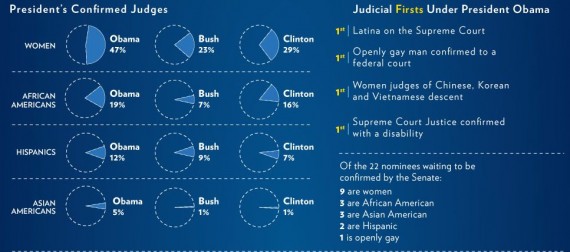White House Counts Sonia Sotamayor As First Disabled Supreme Court Justice
Kevin Drum, points to a White House infographic which purports to list some of the judicial “firsts” under President Obama, including one you may not have thought of:
Justice Sotomayor is disabled, who knew that? Well, it turns out she’s had diabetes since she was a child. Which leads Drum to comment:
Did I already know this? Maybe. My memory is so bad that I couldn’t tell you whether I once knew this and have forgotten, or whether I had never heard this before. In any case, I guess I’ve added two new bits of knowledge to my brain pan today: (1) Sonia Sotomayor has diabetes, and (2) diabetes is considered a disability. Live and learn.
But is diabetes really a disability as we traditionally understand them? It seems to me to be more of a chronic but treatable illness that can be controlled through medication and, in some cases, diet. That seems a far cry from what we usually call a disability.








FYI, under the Democrats’ new version of the ADA diabetes in fact is a “disability,” at least so far as federal discrimination laws and regulations are concerned. As is, well, pretty much everything else. Hell, under the current version of the ADA you’re probably disabled. Me too. Your co-bloggers too. Sleep apnea? You’re disabled. Poor eyesight? That’s a disability. IBS? Disabled. Chronic indigestion? Um, you’re disabled. Minor carpel tunnel syndrome? Yep, you’re disabled.
Obviously this is a problem.
That aside, regarding Justice Sotomayor, me thinks Team Obama here is reaching just a bit. By way of example, Scalia was the first Italian-American on the SCOTUS. Should Reagan have trumpeted that as a significant judicial and political “accomplishment?” Wouldn’t that have been mocked and ridiculed by the chattering classes?
I think that quite a few Supreme Court justices have been near-sighted. However, they’ve worn glasses to correct their vision so it usually isn’t considered a disability. I’d put diabetes that’s treatable either by lifestyle or with insulin in the same category.
I suppose diabetes is a disability if one is unable to go without insulin or have a chocolate sundae. Beyond that I’m not particularly impressed with this “first”, although I have a lot of respect for Sotamayor as a member of the judiciary.
Diabetes can be severely limiting and debilitating but that’s usually only through improper management.
What struck me on the list was the “1st Latina on the Supreme Court”
I first became aware of the issue on the premiere show of “Rob”. When Rob asks Cheech Marin whether he preferred Latino or Hispanic, he responds both are offensive. Then I saw this from the LA Times commented on. So why first Latina rather than first Puerto Rican?
It will be interesting to see how those with diabetes react to being classified disabled. And I wonder, if you have heart disease, are you similarly disabled?
Diabetes is considered a disability, most likely for the need for protections under the ADA. Some workplaces have very stringent break schedules, this doesn’t work if one feels one’s blood sugar dropping and need to drink some juice or take a glucose tab or something similar. So food, and taking injections if one is on injections instead of an insulin pump, are two situations where I can see the need for employment protections in treating it as a disability.
When even those commenting on Kevin Drum’s blog at Mother Jones don’t buy it, I think you can call it a miss by the White House.
@JKB: Serious question, not trolling here I swear. If not “Latino” or “Hispanic”, what label is preferred? “Spanish-American”?
If so, ok…but that’s a lot of syllables, there. I must say that it’s a main reason that I refer to African-Americans as “black” rather than the seven-syllable normative name. Yes, because I’m goddam lazy.
So if you insist on the appellation “Spanish-American”, I’m liable to shorten the name to “Spam”. Just cause, you know, syllables.
Under the ADA, diabetes can count as a disability because it can cause you to have accomodations in the workplace in order to perform your job appropriately. For example, someone who works someplace that only allows for breaks upon supervisory approval, such as a call center, needs to know that they can leave the floor to test their blood sugar or grab some quick glucose and not get written up or have action taken against them.
I am a type II diabetic. Even with good dietary and medical control (my A1c is steady between 5.8 and 6.5), there are days when I am just “off,” and I really can’t get much done. They are rare, but they do happen, and they tend to take up the bulk of my sick hours at work. Since I am not insulin dependent, I don’t have any way to immediate lower my blood sugar if it spikes unexpectedly, and it can take a few hours for it come back down. In the meantime, I have very limited ability to concentrate and – if it is really bad – I can’t even do simple math. And I am an accountant.
Aside from whether diabetes counts as a “disability” for this purpose, I’m skeptical that Sotomayor is the first diabetic Justice in the long history of the Court.
@Tsar Nicholas:
FYI, under the Democrats’ new version of the ADA diabetes in fact is a “disability,” at least so far as federal discrimination laws and regulations are concerned.
The ADA Amendments Act of 2008 was passed with a vote of 402 to 17 in the House, and unanimously in the Senate, and then signed into law by President George W. Bush. I had no idea the Democrats had such congressional majorities in 2008, nor that Bush was a Democrat. Live and learn, I guess.
By the way, this was the reason for the amendments under discussion:
More explanation in Steny Hoyer’s 2002 op-ed in WaPo, “Not Exactly What We Intended, Justice O’Connor.”
Anyway, let’s look at how accurate the Romanov’s claims are:
Sleep apnea? You’re disabled.
Wrong
Poor eyesight? That’s a disability.
Depends on your definition of “poor.” Blindness is certainly a disability.
IBS? Disabled.
Nope
Chronic indigestion? Um, you’re disabled.
Wrong
Minor carpel tunnel syndrome? Yep, you’re disabled.
Sorry, no.
Obviously this is a problem.
It is a problem that you choose to lie so much, but it’s your problem.
Regarding diabetes, I’ll let the EEOC explain:
Diabetes is a disability when it substantially limits one or more of a person’s major life activities. Major life activities are basic activities that an average person can perform with little or no difficulty, such as eating or caring for oneself. Diabetes also is a disability when it causes side effects or complications that substantially limit a major life activity. Even if diabetes is not currently substantially limiting because it is controlled by diet, exercise, oral medication, and/or insulin, and there are no serious side effects, the condition may be a disability because it was substantially limiting in the past (i.e., before it was diagnosed and adequately treated). Finally, diabetes is a disability when it does not significantly affect a person’s everyday activities, but the employer treats the individual as if it does. For example, an employer may assume that a person is totally unable to work because he has diabetes. Under the ADA, the determination of whether an individual has a disability is made on a case-by-case basis.
If an employer denied someone a job because he/she had diabetes even though he/she manages the disease and it has no impact on his/her work, that employer would be in violation of the ADA (since 2008). The law is there to protect people from discrimination, and diabetes sufferers have certainly been discriminated against in the workplace (e.g. Orr v. Wal-Mart Stores, Inc.). Not all diabetes sufferers would be considered disabled in court, but many would.
@James Joyner:
You are probably correct but they would have served before the Americans With Disabilities Amendments Act of 2008 was signed into law by President Bush. This is apparently the legal basis upon which diabetes and a number of other chronic illnesses are considered disabilities for purposes of the ADA
I agree that it is an odd choice to pick as a “first.” And certainly a Supreme Court justice has much more control of his or her schedule than a cashier at WalMart or the service rep at your insurance company. I just wanted to address the question of whether effective diabetes management does in fact require workplace accomodation.
I thought they meant unqualified and incompetent.
@bandit: If “unqualified and incompetent” was a disability that would mean every member of congress would qualify.
So Benjamin Cardozo does not count as the first Hispanic Justice on the Supreme Court?
Even leaving aside the question of whether or not properly treated diabetis is a disability, the White House may still be wrong even if it is. Eugene Volokh notes in his post on this news that Justice Henry Brown, who was on the Court form 1890 to 1906, was apparently blind in one eye when he took the bench. Also Justice William O Douglas was by some accounts legally blind during his final years on the bench.
Diabetes is treatable, but in the people I have know who suffer from it, the long term effects are pretty devistating. The reality of the disease can be very different from the picture presented by those active, attractive people we see testing their blood sugar levels on TV commercials.
@Thomas: Only in a world where Sephardic Jews of Portuguese descent count as Hispanic.
Is there a switch that will change bandit’s name to “Hateman” whenever he comments?
@Thomas:
I think we are at the point where, notwithstanding its etymology, “Hispanic” is popularly understood as referring to someone from Central or South America or the formerly Spanish islands in the Caribbean. I think most people today would consider someone from the Iberian Peninsula (Hispania) to be Spanish, Portuguese, or simply European
What, none of the others are asthmatics?
Seriously, just having diabetes is not necessarily a disability. This is silly.
Is Obama getting us close to James Watt’s record of “a black, a woman, two Jews and a cripple.?” ‘Cuz that’s the current high mark.
@Jenos Idanian:
Actually, as warped as Watt seemed to be, that describes 5 of the 9 justices on the Court right now. I wonder why Watt left out, “a broccoli-obsessed Catholic”?
Speaking of which…
@Ben Wolf: Good projection
I’m sure that some of the elderly justices had developed diabetes while serving.